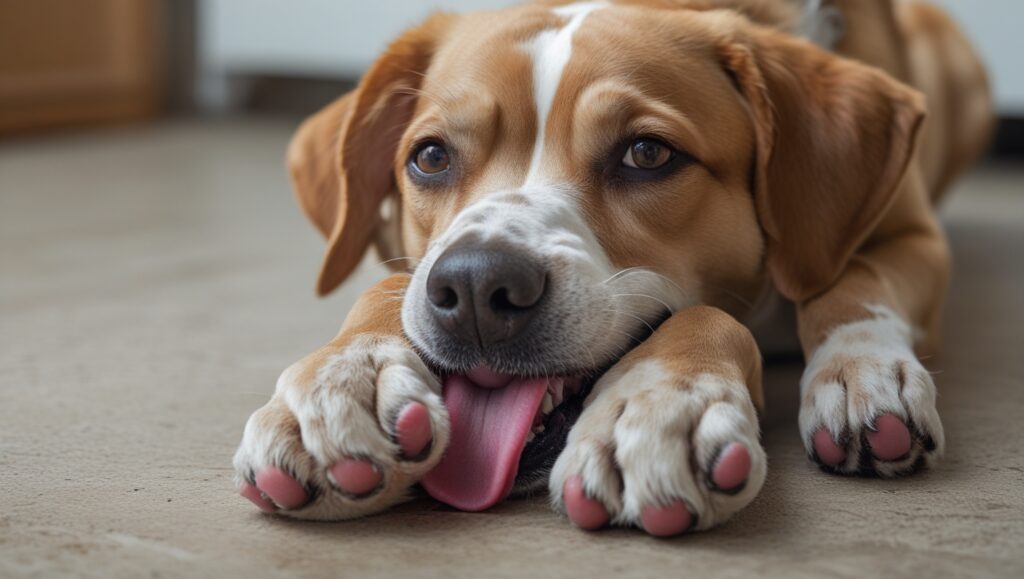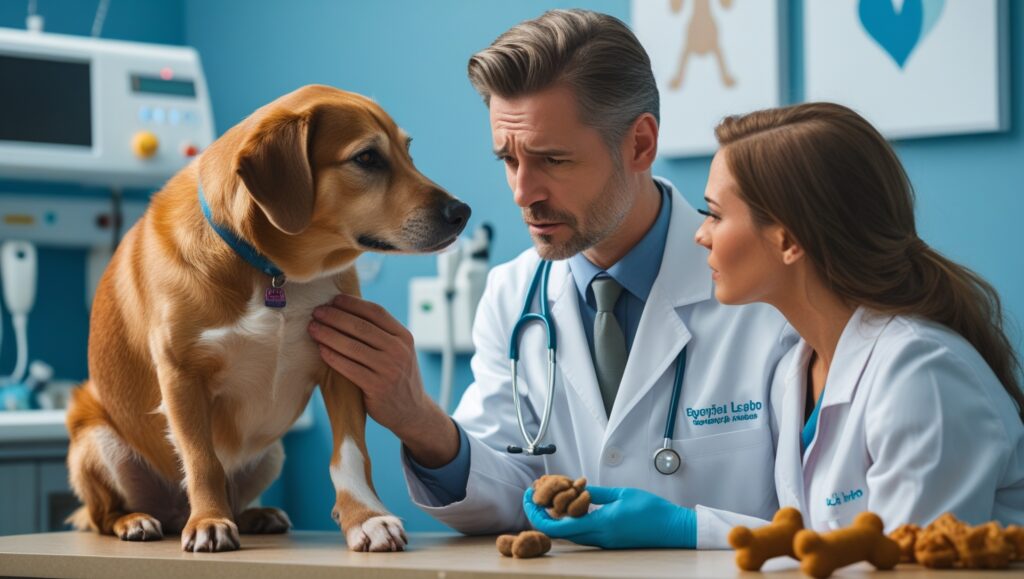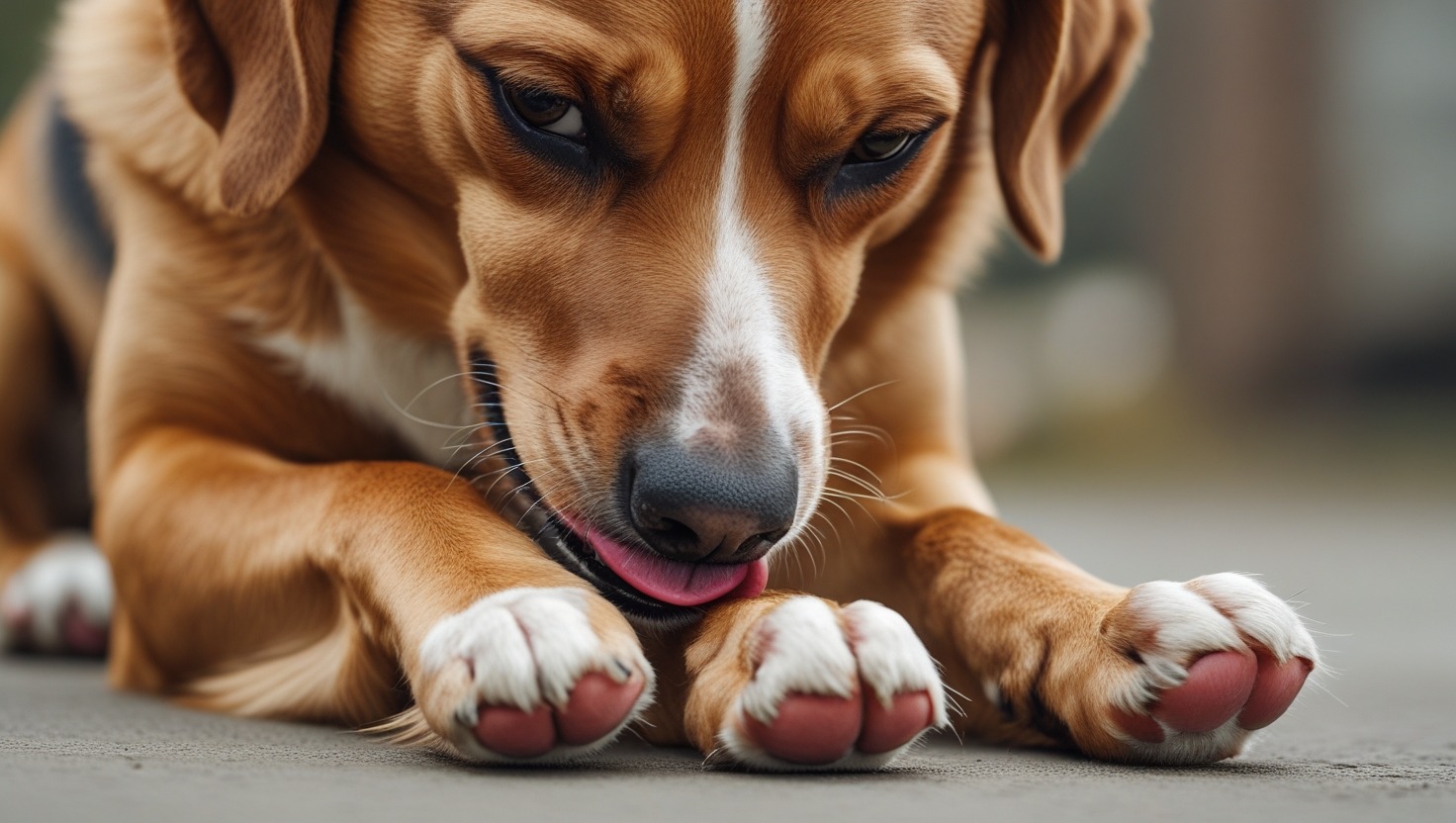A person who has a dog can usually see it constantly licking or biting its paws. Although relatively few licks should be normal, excessive licking may also be a sign of some more serious condition. As soon as you feel worried about the fact that your dog is licking and biting paws all the time, you are not the first one to feel so. The conduct is attributable to numerous medical or emotional factors, and establishing the purpose in the initial phases of treatment is a significant element of successful recuperation.

So, here we go: what is normal, what is not, and what you can do to get your dog out of this pain with much fewer risks and in a much shorter time.
Is Licking of Paws Normal in Dogs?
Light, intermittent licking of paws is a routine conduct of grooming. However, when one or more paws of your dog are being chewed, bitten, or licked regularly throughout the day, this normally raises a red flag. It may be the pain, itching, restlessness, or the indication of some medical issue.
Some Disorders that Lead to Licking and Biting of Paws by Dogs
The first step towards giving appropriate treatment is understanding the cause of the problem. The most common causes are listed here:
1. Environmental/Food allergy
Whether it is food, pollen, grass, dust mites, or chemicals, dogs, like human beings, can become allergic to ingredients.
Symptoms:
Red Marking, Swelling, Constant Licking, and Ear Infections
Treatment:
A veterinary doctor may prescribe either a removal diet or an allergy test. The reduction of allergens can also be observed by wiping paws after walks.
2. Pests and Vermin: Fleas and Parasites
Also, the paws can be inflamed by fleas, ticks, or mites, and this can take place when the infestation is somewhere near the feet or in between the toes.
Symptoms:
Gnawing, gnawing, gnawing, gnawing, and black spotting (flea dirt)
Treatment:
Suggested flea antiparasitics, for vet rule, along with a commensurate house cleaning.
3. Bacterial or Fungal Infections
Dogs will also get yeast infections between their toes and so will have moisture trapped between their paws.
Symptoms:
Red, swollen, stinking, and brown.
Treatment:
Oral or topical antifungal or antibiotic remedy, per office visit with the vet.
4. Those affecting Integrities or Foreign Objects
A few cuts or splinters, burns, or thorns stuck inside the body could also make your dog lick to relieve the pain.
Symptoms:
Limping, open wounds, swelling, and using one foot
Treatment:
Look well at the paws to make sure they have not been injured. Visit your vet to clean and treat the wounds in case necessary.
5. Dry Paws or Cracked Paws Pads
Cold, piercing salt, hot pavement, or harsh surfaces may dehydrate the paw pads, causing them to get irritated and be licked off.
Treatment:
Visit a veterinary surgeon in case of injuries, apply a dog-safe paw balm after every walk, and stay off rough surfaces.
6. Fear or ennui
Another way that licking occurs in dogs is due to stress. Separation anxiety, boredom, or spending some time alone tends to induce this repetitive behavior.
Treatment:
perform more playtime, introduce puzzle toys, or hire a behaviorist to deal with anxiety.
Regarding When to Go to a Veterinarian
When licking and biting in your dog has turned into an obsession or is causing apparent damage (on skin, infection, or limping), take no chances. A vet can:

- Carry out allergy or skin tests.
- Determine infections or parasites.
- Prescribing behavior therapy.
- Medicated shampoos, creams, or medications should be prescribed.
Useful Home Treatments and Prevention
Although you may need medical help, there are also adequate measures that you can take at home:
1. Paw Checks and cleaning regularly
Wipe your dog when you get inside after a walk, and pay special attention to your dog’s feet with a wet cloth or pet wipe so as to remove those irritants.
2. Use Paw Balm or Coconut Oil
Apply paw balm or virgin coconut oil made in the name of dog safety to heal dryness and irritation. Avoid applying human lotion.
3. Paw Socks/E-Collar
In case your dog licks their paws, resulting in damage, protective gear is able to break the cycle so that healing may occur.
4. Change to Hypoallergenic Food
Your vet can advise you on food trials in case you suspect food allergies. Occasionally, the relatively simple solution of relying on limited-ingredient diets or grain-free diets can help a lot.
5. Shy away from Rough Surfaces
When going on walks, do not walk on hot pavements during the summer, and do not walk on sidewalks that have been salted during the winter. In extreme cases, use dog boots.
The potential Nutraceutical Products
Though selling products may be effective through prescriptions, numerous natural products can work on paw health as well. Never use new remedies until you check with your vet:
- Oatmeal-derived shampoos: Soothe the skin and decrease itching
- Sprays (dog-safe) aloe vera: Reduce inflammation
- Diluted apple cider vinegar rinses: Combat fungal infections
What will occur should you ignore it?
Continued licking and biting of the paws may result in:

Karine Cronin was a woman of open wounds and open ulcers. Her open wounds and open ulcers were attributed to her radiance, with their radiance. That colony of convenient ash left so many open ulcers on her face. That colony of convenient ash on her open-wound face
- Secondary bacterial infections.
- Lichens are skin layers that are thickened and crusty (lichenification).
- The performance of the paw pads is permanently damaged.
- Intensified anxiety or compulsive behavior.
Appropriate treatment not only saves your pet dog the pain but will also save future costly medical treatment.
Final Thoughts
Dog licking and biting paws is not simply a bad habit; this is how your pet informs you that something is wrong. It could be allergies or an injury or even emotional stress, but it is indispensable to get to its underlying root early and cure the same accordingly.
Make it a habit to refer to your vet first, after which, proceed to preventative measures and home remedies that are not harmful. Bringing your dog to the wagging of his tail and shaking his paw will take a bit of time and, of course, patience, love, and the right attitude.
Is it because my dog is hurt that he keeps on licking and biting his paws?
Yes. Periodic licking is quite fine, but at other times, when licking is overdone, there is a likelihood that infections, open wounds, or even severe complications might arise, and this has to be dealt with by a veterinarian.
Could it happen that my dog is biting its paws due to allergies?
Absolutely. The most popular causes are environmental and food allergies. Your vet can prescribe a change of diet, allergy medication, or cleaning of the paws.
What can I do to prevent my dog from licking his/her paws as a boredom behavior?
Exercise the brain, use toys, be more active in terms of walking, and spend useful time with your dog. Most of the time, licking can be easily confused with boredom.

